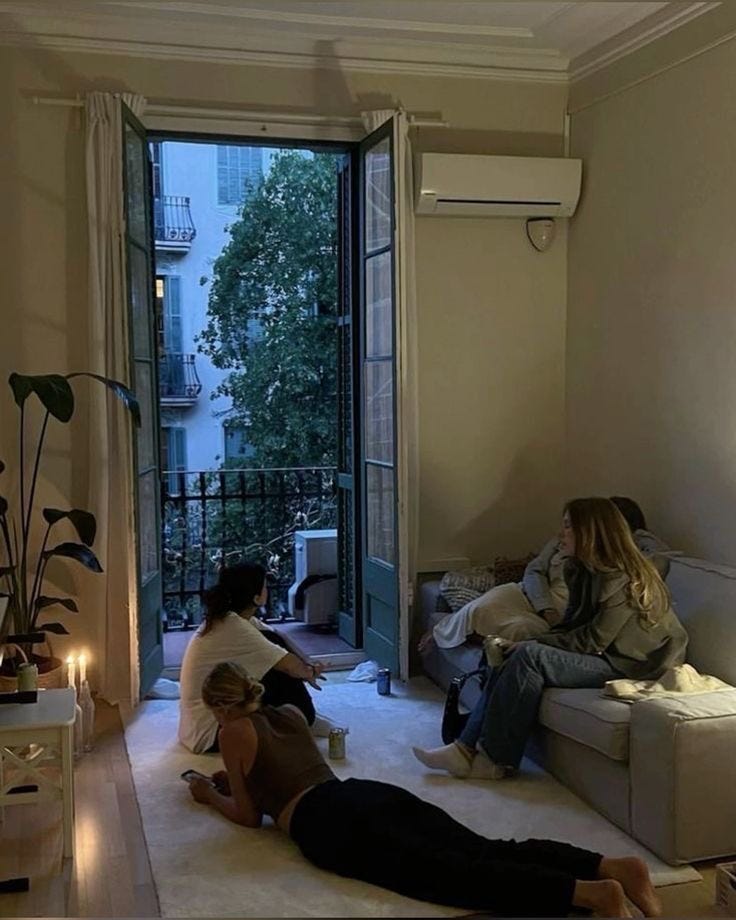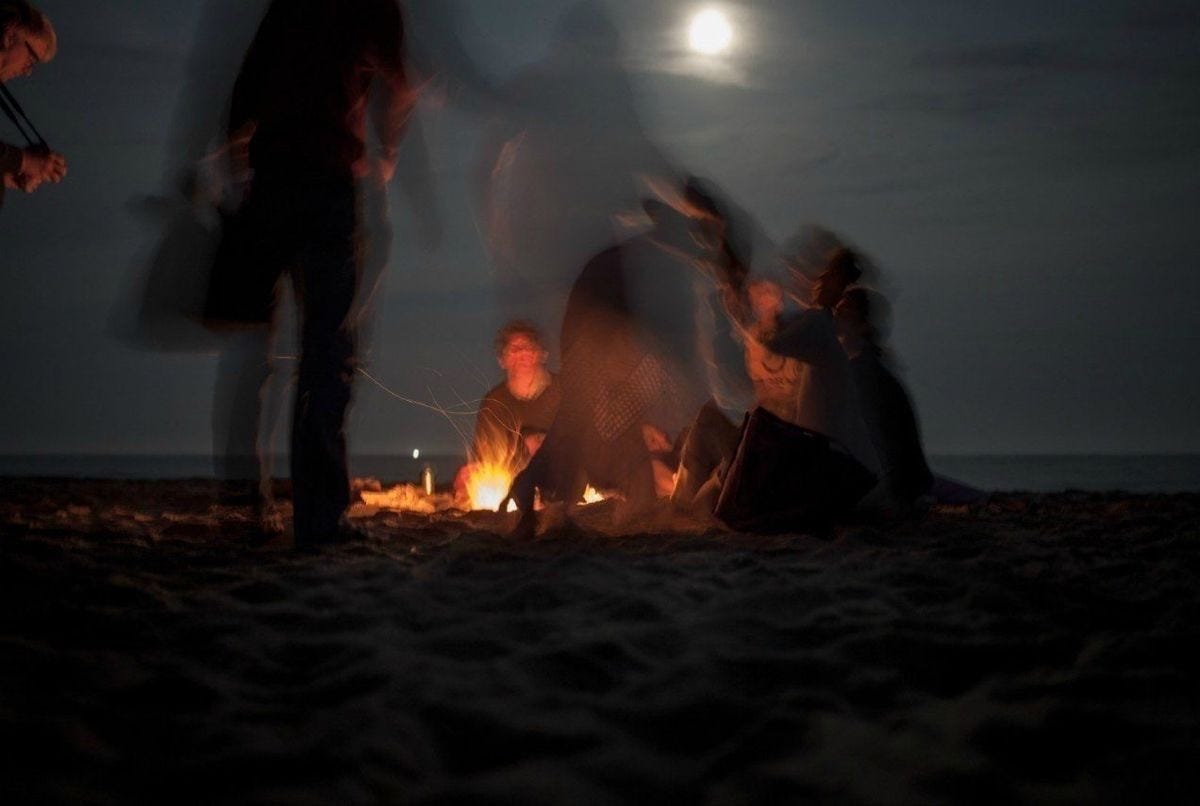the idea of friendship often centers around constancy. the ride-or-die. the forever friend. the weekend familiar. these narratives are soothing—they offer emotional security, clear structure, and the comfort of being someone’s person. yet for many, friendship unfolds in a far more ambiguous shape: not a circle, but a constellation. not a steady rhythm, but an occasional pulse. somewhere between proximity and intimacy lives the figure of the floater friend—the one who knows many, is known by most, but belongs nowhere entirely.
this isn’t the story of the outsider or the socially excluded. it’s something softer, subtler, and harder to notice. floater friends appear in photos, but rarely in the front row. they’re tagged in stories, but not often in memories. they’re the second thought, not the first call. always there, but not always kept. this position isn’t always painful, but it is emotionally weighty. it creates an experience of presence without place, connection without anchoring. and it’s rarely examined—because unlike loneliness or rejection, it doesn’t disrupt a narrative. it just never becomes one.
the floater friend adapts. they’re the ones who fit in across contexts, who know how to mirror energy, who can shift tones depending on the room. that adaptability is often born from early experience: changing schools, growing up in emotionally unstable environments, learning to sense what others need in order to be accepted. it becomes second nature to adjust. and with that adjustment, a quiet form of erasure often slips in. desires are dulled. needs are delayed. opinions are shaped by what feels welcome. it becomes easier to bend than to risk not being asked again. identity starts to feel like a costume that shifts slightly depending on the social lighting.
and yet, floater friends often become deeply valuable to the groups they orbit. they’re the quiet listeners, the generous observers, the ones who bring lightness and nuance to a room. because they don’t anchor in one group, they bring perspective. because they’re not deeply embedded, they rarely fuel drama. but that same fluidity makes it easy for others to overlook their emotional needs. they become associated with ease, not depth. support, not vulnerability. presence, not priority. and that creates a quiet paradox: being the most socially competent person in the room, while feeling the least emotionally safe in it.
this isn’t about villainizing tight-knit friendships or demanding constant inclusion. it’s about exploring an under-discussed social pattern that shapes many adult friendships. we have names for codependence. we have names for toxic dynamics. we have names for the friend breakups that leave dramatic aftermaths. but the floater friend is something quieter. someone who has plenty of friends on paper, but no one to call in the middle of the night. someone who is always on the invite list, but never in the inside joke. someone who adds value but rarely feels like they add weight.
and it’s complicated, because often the floater role is not assigned—it’s chosen, at least at first. it can be a kind of freedom. the avoidance of entanglement. the safety of not being too close, not having to explain yourself too often, not needing to participate in every small drama. it’s a space that allows room for observation, autonomy, and boundary. but like any position taken out of self-preservation, over time, it calcifies. and what was once a preference becomes a pattern, then a personality.
in our culture of hyper-connectedness, the floater friend stands as a quiet contradiction. in a world of group chats and shared locations, of best friend reels and nostalgia-stamped captions, the floater occupies the empty spaces between other people’s memories. they’re part of everyone’s lives but seldom part of anyone’s core. and that invisibility creates its own kind of grief. not loud. not explosive. just persistent.
it also carries a particular kind of social math. floater friends are often managing multiple friendships that don’t overlap. this means different languages, tones, contexts. it’s emotional translation at scale. while others settle into the shorthand of a single group identity, the floater is doing the unglamorous work of continual adaptation. they keep the names straight, the birthday plans organized, the group dynamics unspoken but understood. they are diplomats without embassies. welcomed everywhere, protected nowhere.
additionally, social media has made the performance of intimacy more visible and more painful. you don’t just hear about your friends’ other plans—you see them, in high resolution, with captions that read like micro-essays on belonging. the floater’s absence is rarely malicious, but it’s not mourned. and when you already feel peripheral, the curated joy of others only deepens the feeling that your friendships are disposable, context-based, or situational rather than rooted.
in pop culture, the floater rarely gets screen time. tv shows and books focus on dramatic ruptures or lifelong bonds. they’re either love letters to female friendship or exposés on its implosion. but the middle-space doesn’t sell. it’s too blurry. too quiet. yet that is the reality for so many people—friendships that matter, but don’t anchor. affection that is sincere, but not consistent. inclusion that is real, but not reliable.
how floater friends feel (and what they wish they could say)
1. included but unrooted
there’s a difference between being invited and being expected. floater friends often receive the invitation—the brunch text, the birthday plan, the last-minute seat at the table. but rarely do they feel like the plan was built around them. they are welcome, but not integral. liked, but not leaned on. this inclusion without centrality creates a quiet dissonance: a feeling of always being near the center, but never the center itself.
2. dependable, but never asked twice
floater friends are often the ones who check in, who remember your exam date, who text you on a random wednesday. they offer warmth easily. but their support is often mistaken for self-sufficiency. people assume they don’t need the same in return. they rarely get the second follow-up. the “how are you, really?” question. the space to not have it together. and over time, that shapes how they show up: helpful, but not messy. present, but never demanding.
3. known socially, but not emotionally
many floater friends have a wide network. they know people in every city, every context. they can navigate social situations with ease, adapt to dynamics on the fly. but that breadth comes at a cost. few know their fears, their real history, the things that keep them up at night. they are familiar, but not known. their name is easy to say, but their presence doesn’t anchor in memory. and they begin to internalize that absence: maybe i’m just easier to be around than to be close to.
4. longing for ease, not drama
floater friends don’t crave grand declarations. they don’t want spotlight or constant contact. what they want is ease. the kind of friendship where you can show up tired and be welcomed anyway. where you don’t have to reintroduce your past each time. where someone notices your silence before you explain it. they want to be held with quiet certainty, not dramatic reassurance. they want someone who just knows where they belong in the room—and makes space accordingly.
5. remembered in moments, not in meaning
there’s a difference between being appreciated and being carried. floater friends are often thanked in passing. complimented for their presence, their vibe, their ease. but that admiration rarely translates into deep remembering. they’re rarely part of the rituals. rarely pulled into tradition. their name comes up, but not as someone whose absence changes the temperature of the room. and that distinction matters—not for ego, but for emotional safety.
6. grateful but exhausted
floater friends are usually grateful for the friendships they do have. they know how hard adult connection can be. they don’t take gestures lightly. but the gratitude can feel complicated—because it’s often mixed with exhaustion. exhaustion from holding space for others, while being uncertain whether there’s space being held for them. exhaustion from never quite being allowed to fall apart, even when they’re the ones stitching others back together.
floater friends are not weak. they are not lacking. they are not failed versions of the social ideal. they are, in many ways, the quiet glue of modern friendship. but glue, when not acknowledged, becomes invisible. and everything that is invisible eventually begins to question its worth. there is room to reimagine friendship in ways that hold space for this archetype. ways that invite depth without demanding permanence. ways that notice the ones who always show up, even if they never ask to be seen. in a culture that centers loud intimacy, maybe the soft, steady presence deserves a little more reverence.
not everyone is a best friend. but everyone deserves to be held somewhere. to be more than a pleasant presence. to be remembered in the quiet moments. to be felt when they are not there. the floater friend dilemma is not that they drift. it’s that no one ever built them a place to land.










Totally resonate with this but not sure how to change it
it’s tough because it’s often a chosen reality. being apart of that “centre” often comes with so many responsibilities, risks and a lot of emotional labour, and i think people in this position often want to have the freedom to opt out. it can make life simpler to be a floater, but also that little bit colder in a way. i think it’s a trade off that needs to be made; intimacy, but giving up a portion of your freedom, or preserving that part of your independence but also having to deal with a level of exclusion.